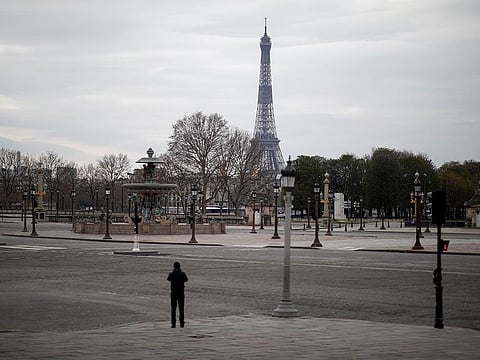France’s top-down approach isn’t working
Response to Covid-19 has exposed deep-rooted problems French state needs to resolve

France didn’t need a coronavirus to wake up to the benefits of big government.
The nation of Jean-Baptiste Colbert — the 17th-century top-down economic planner who likened taxation to the art of plucking feathers from a goose — was already the top state spender and tax collector relative to economic output among its OECD peers before the epidemic struck. While the merits of an effective civil service in a pandemic are belatedly dawning on Americans, the French state is doing more of what it’s always done: Ramping up existing furlough schemes, pledging €300 billion (Dh1.1 trillion or $325 billion) in bank-loan guarantees and protecting national corporate champions.
Still, the developed world’s biggest public spender has also been humbled by this virus.
Ruptures
The French welfare state rarely lacks for anything, yet the country has suffered the same supply shortages seen around the world. Medical masks are being rationed after a national stockpile was allowed to run dry. A reluctance to test widely is looking increasingly like a resource problem: The government’s target of 500,000 tests per week by May 11 is a rate Germany — which has reported a much lower death toll than France — achieved in March.
France’s strict lockdown measures, initially widely supported by the public, are now seen as symptomatic of a slow crisis response, especially as other countries move more quickly to lift theirs. Confidence in President Emmanuel Macron has taken a hit after an initial bounce in the polls a month ago; it has only slightly picked up after a recent speech admitting to “weaknesses.”.
If big government is indeed the best antidote to the current pandemic crisis, how did an omnipresent state — with what was once rated the best health care system in the world — fail to lead the way in handling Covid-19?
Re-prioritise
Aside from factors like luck, or the unpredictability of infections, the French seem to think the problem was not enough state intervention and spending. A recent survey on France’s future by newspaper Liberation found that 84 per cent wanted the state to relocate as much manufacturing as possible from Asia; 68 per cent wanted to nationalise strategic industries; 56 per cent wanted the state to intervene systematically in business; and 54 per cent wanted a much stricter form of national protectionism.
Arnaud Montebourg, a former economy minister and foe of Macron, blamed a state obsessed with budgetary rigour and “austerity”. The 42-year-old Macron, elected in 2017 on a platform to reform France, has himself promised “massive” investments to come, telling Le Point, “I’ve always believed in the state”.
Comparisons tell a different tale
Bringing manufacturing of strategic goods back home makes sense in some areas, but the general idea that the state lacked financial resources or power going into this crisis is an unconvincing one. Germany spends exactly the same proportion of its GDP on health care as France — 11.2 per cent — yet the country has more intensive-care beds, more doctors and more nurses per capita than its neighbour, according to OECD data.
This higher density of care can make a big difference if “super-spreader” infections strike small cities; a mega-church event in eastern France earlier this year is seen as the reason for that region’s high death count of around 2,500.
This comes down to decision making, not money: In Germany, a decentralised structure gives more say to federal states and makes it hard to deprive regions of resources from above. France’s top-down system, meanwhile, does the opposite. Over the years a state-led bureaucracy has favoured flashy mega-hospitals in urban areas while closing beds elsewhere, ignoring local officials’ protests.
Brittle responses
More cash alone wouldn’t curb the centralising tendency of the state’s power, its Jacobinism. It was the state that decided a national mask stockpile might not be necessary back in 2013, when Montebourg was in government. And it was the state that stuck to a cautious stance on testing for the coronavirus after it was declared a pandemic by the World Health Organisation, refusing to give regulatory permission to 75 regional laboratories to perform up to 300,000 tests a week, according to Le Point.
Sure, too much decentralisation can also bring problems — witness the disunited US responses. But France is at the other extreme: One state official was recently suspended after suggesting job cuts should proceed at a university hospital in the country’s badly stricken eastern region even in the midst of the crisis.
Right now, the pandemic is still raging, and the priority is rightly limiting the human cost. All European countries — including fiscally hawkish Germany — are rolling out emergency spending plans with the support of the European Central Bank and the European Commission, the European Union’s executive body. With French faith in Macron hanging by a mask thread, this is not the time to pinch pennies.
But France entered this crisis with a budget deficit of 3 per cent and a debt-to-GDP ratio of 100 per cent; it will emerge with a deficit of 9 per cent and a ratio closer to 130 per cent, according to economist Marc Touati. Even in the age of Modern Monetary Theory, the question of who is going to foot the bill for the post-Covid-19 state will resurface eventually.
“We’re spending much more than our neighbours to get the same social model,” Bank of France Governor Francois Villeroy de Galhau told Journal du Dimanche. “We will need to manage things more efficiently.”
Economists reckon tax hikes are inevitable at some point. If more feathers are going to be plucked, a rethink of the top-down way of doing things would be wise.
Sign up for the Daily Briefing
Get the latest news and updates straight to your inbox


